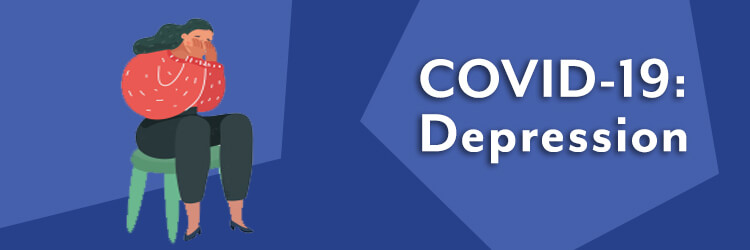[vc_row][vc_column][vc_column_text]People with Depression often feel hopeless. Now with the pandemic and recent police brutality, the world can seem hopeless even to people who don’t have Depression. In the coming weeks, we will share mental health resources for Black people dealing with racial trauma. In this particular blog I’m going to focus on Depression in general, and how it interacts with the COVID-19 crisis.
In April, a federal emergency hotline for people in emotional distress saw a 1,000% increase in calls. Loneliness has been linked to Depression in numerous studies. Physical distancing doesn’t necessarily cause loneliness—but it is likely that limiting human contact for months will increase feelings of isolation.
Chronic stress also influences Depression—increasing the “stress hormone” cortisol and decreasing serotonin and dopamine. When these chemicals are off balance, susceptible people are more likely to become Depressed.
Then there is uncertainty, which can play into hopelessness. Many people—even those who don’t necessarily have Depression—might be finding it hard to stay motivated lately. Lack of interest in activities you once enjoyed is one symptom of Depression. This complicates things. It might be hard to tell if you’re Depressed or just living through distressing times.
Coping with Depression can be complicated, too. You can’t just snap out of it. A lot of the things people may suggest—like exercising—can feel exhausting and unmanageable when you barely have the energy to get out of bed.
One suggestion is to ask someone who makes you feel safe to check in with you regularly, especially now. This takes the emotional energy off you and is a reminder that you have someone in your corner. Picking one person also takes the pressure off to contact multiple people.
It can be helpful to let the person know in advance what you need when you’re most depressed. Would it help to go for a walk with them? Do you want to talk and have someone listen? Or conversely, do you want to not have to talk and just hear their voice?
If you are not sure what is best for you, journaling can help—especially if you are having a decent mental health day and want to prepare for worse times. Ask yourself some prompts like “What helps me feel less hopeless?” “What is something another person can do to care for me?” “What is something I can do for myself?” The answers will help you and anyone who wants to support you.
Trying to get outside is also important. Nature is not a cure for any mental health condition, but staying inside all the time can be detrimental. Now that there’s not many other places to go, try taking advantage of the ability to be outdoors.
Even if you only have enough energy to step outside your door for a few minutes—those few minutes won’t be wasted. The fresh air is helpful, and you’ll feel good knowing you’ve taken steps to care for yourself.
You also might ask your physician about either going on or switching medications. There can be a stigma about meds, but there shouldn’t be. Just like some people need to take pills for physical health symptoms, others need to do so for mental health symptoms.
Now might be a difficult time to adjust to a new medication, but a doctor can help you do so on the appropriate timeline. If you’re concerned about starting new meds during a pandemic, bring that up to your physician or psychiatrist.
TruHealing Centers’ facilities offer Gene-Sight Testing: an in-depth way to understand how medications might interact with your body chemistry. This makes the process of finding the right medication move faster and with less side-effects.
If you are struggling with Depression or a co-occurring Substance Use Disorder during the COVID-19 crisis, there is hope. TruHealing Centers is open, with hospital-grade sanitization and telehealth options so you can feel safe in treatment. At our recovery centers across the country, our staff will give you the tools to thrive. Call an admissions specialist at 410-593-0005.[/vc_column_text][/vc_column][/vc_row]









